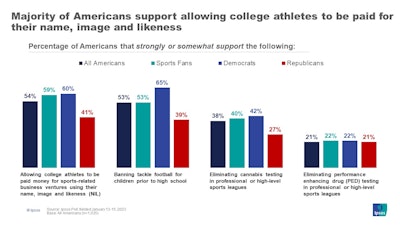Over half of Americans (54%) support allowing college athletes to be paid for sports-related business ventures using their name, image, and likeness (NIL), according to a recent poll from market research and consulting firm Ipsos.
The Ipsos Sports Poll surveyed Americans of varying ages – 1,035 general population adults, ages 18 and up – about a number of topics related to athletics, including sports played, sports fandoms, issues in the sports industry, and NIL rights.
The poll found that 57% of Americans agreed that the NIL monetization had a positive impact on college athletics by ensuring players were fairly compensated.
“All signs for the past few years have pointed to this becoming the norm,” said Mallory Newall, a vice president at Ipsos. “By in large, Americans support that. Most feel that NIL has a positive impact on college athletics because it allows for fair compensation and allows the players to, through endorsement deals and the like, profit off of the corporations that are trying to use their name rather than all of this money going into the hands of other businesses or university administration or not to the player directly."
The majority of Black Americans (70%) supported payment for NIL, according to the poll. Meanwhile, there was a more even split for white Americans (50%).
"As we know, most NCAA Division I athletes, particularly when it comes to Division I football, they're disproportionally Black,” Newall said. “And so, I think the fact that we see such a strong majority of Black Americans … supporting this, just underscores that Black athletes are going to be benefitting from these NIL deals. So to me it makes sense that Black Americans are broadly supportive."
Different age groups also slightly affected polling results. When given the two options of ‘NIL monetization is good because it ensures players are fairly compensated’ and ‘It’s bad for college athletics because it gives certain schools a competitive advantage,’ younger Americans -- Gen-Z, millennials, Gen-X – were more supportive of NIL and feel that it's a positive thing, Newall said.




















